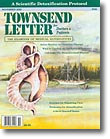


November 2002
The Effects of Dietary Lithium upon Mood and Behavior
by Melvyn R. Werbach, MD

While often effective in treating serious emotional disorders, lithium at pharmacologic doses (generally 900,000 micrograms or more daily) has serious limitations due to many potential side effects, some of which are common. Moreover, because it is quite toxic at a serum level which is not much higher than the level needed to achieve the "therapeutic range,” serum lithium levels must be tested periodically.
It is not generally known that lithium at levels that are naturally present in the diet may exert a powerful effect on behavior without any of the dangers of pharmacologic dosages. There is evidence, for example, that low levels of tap water and/or urine lithium correlate with higher mental hospital admissions due to diagnoses of psychosis, neurosis, schizophrenia, personality disorders and homicides.1
Such nutritional lithium levels appear to be particularly related to aggressiveness. When male rats were placed on a lithium-deficient diet, they became less aggressive both in social interactions with other rats and in response to human handling.2 In humans, the relationship between nutritional lithium levels and aggression appears to be the opposite. Violent criminals have been found to have reduced hair lithium levels.3,4 Moreover, a study of 27 Texas counties found that the incidences of suicide, homicide and rape were significantly higher in counties whose drinking water supplies contained little or no lithium compared to counties with higher water lithium levels, even after correcting for population density. Corresponding associations with the incidences of robbery, burglary and theft were also significant, as were associations with the incidences of arrests for possession of opium, cocaine and their derivatives.5
Results of a few early human intervention studies suggest that providing a nutritional level of lithium supplementation can have substantial mental and emotional benefits. In a 4-week study, the 16 male and 8 female subjects were all former drug users; some were violent offenders or had a history of domestic violence. They randomly received 400 mcg daily of lithium in tablets composed of lithium-rich brewer's yeast, or similar tablets in which the brewer's yeast was lithium-free. Each week they completed questionnaires measuring mental and physical activity, ability to think and work, mood and emotionality. In the lithium group only, total mood test scores increased steadily and significantly during supplementation.6
Even a lower lithium dosage may be adequate. In an open trial, 6 female and 7 male depressed patients aged 18 to 50 years, most of whom had been diagnosed by their personal physicians as having a bipolar disorder (5 out of the 7 men had sisters who were on standard lithium doses), received 50 mcg of natural lithium derived from vegetable concentrates with each meal. All 13 patients improved in about 10 days and there were no side effects. Because the dosage was so low, serum lithium levels were not measurable. After 6 weeks, they were taken off of lithium and, within 3 days, all 13 patients had regressed to their former state of depression. Lithium was resupplied and, after another 2 days, they improved once again with elimination of the depressive symptoms.7
Assuming that a person consumes about one liter of water daily from municipal supplies, it is striking that the therapeutic level of lithium from natural sources is so similar to the level consumed by residents of the Texas counties with higher lithium levels in the study I cited earlier. In the Texas drinking water study, the lithium level of drinking water in those counties with higher levels (and decreased violence) was between 70 and 170 mcg per liter, which lends further support to the hypothesis that only 50 mcg of lithium taken 3 times daily with meals may have substantial positive effects on mood and behavior – especially for people who live in areas where the levels of lithium in drinking water are low.
Doctor Werbach cautions that the nutritional treatment of illness should be supervised by physicians or practitioners whose training prepares them to recognize serious illness and to integrate nutritional interventions safely into the treatment plan.
References
1. Dawson EB. The relationship of tap water and physiological levels of lithium to mental hospital admission and homicide in Texas, in Schrauzer & Klippel, Eds. Lithium in Biology and Medicine.. Cambridge, VCH, 1991:169-88
2. Klemfuss H, Schrauzer GN. Effects of nutritional lithium deficiency on behavior in rats. Biol Trace Elem Res 48(2):131-9, 1995
3. Schrauzer GN, Shrestha KP, Flores-Arce MF. Lithium in scalp hair of adults, students, and violent criminals. Biol Trace Elem Res 34(2):161-76, 1992
4. Walsh, William J., analytical chemist, Argonne National Laboratory, USA - reported in Sci News 124:122-5, 1983
5. Schrauzer GN, Shrestha KP. Lithium in drinking water and the incidences of crimes, suicides, and arrests related to drug addictions. Biol Trace Elem Res 25(2):105-13, 1990
6. Schrauzer GN, de Vroey E. Effects of nutritional lithium supplementation on mood: A placebo-controlled study with former drug users. Biol Trace Elem Res 40(1):89-101, 1994
7. Fierro AA. Natural low dose lithium supplementation in manic-depressive disease. Nutr Perspectives January, 1988:10-11
If you treat patients with psychological
symptoms, you will want a copy of Doctor Werbach's thoroughly revised
and expanded second edition of Nutritional Influences on Mental Illness.
For more information on his books, see the Third Line Press web page (www.third-line.com)
or contact Third Line Press directly:
4751 Viviana Drive
Tarzana, California 91356, USA
818-996-0076
818-774-1575 (fax)
E-mail: tlp@third-line.com

Search
our pre-2001 archives for
further information. Older issues of the printed magazine are also indexed
for your convenience.
1983-2001
indices ;
1999-Jan. 2003 indices
Once you find the magazines you'd like to order, please use our
convenient form, e-mail subscriptions@townsendletter.com,
or call 360.385.6021 (PST).
All rights reserved.
Web site by Sandy Hershelman Designs